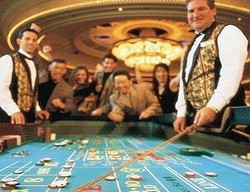 For a century and a half Monaco, with its Monte Carlo Casino, has been the essence of classical gambling elegance. The casino, or casino complex, has been the leading European gambling facility until recent times. It was the most prominent casino property in the world until the advent of the Las Vegas megacasinos. Monaco itself is a historical throwback, a city-state of less than one mile square on the French Riviera coast of the Mediterranean. It is surrounded by water on one side and by France on the other three sides. The state began as a semiautonomous political entity in the thirteenth century when an exiled clan called the Grimaldis established their independence from the Republic of Genoa on the then-barren seacoast spot. The geographical isolation and seemingly worthlessness of the land helped preserve its independence. That independence has over the centuries become the reason for existence of the state of Monaco. Survival has come through isolation, treaties and diplomacy, and trade concessions, but mostly through the establishment of an economic base by means of the creation of the casino resort complex.
For a century and a half Monaco, with its Monte Carlo Casino, has been the essence of classical gambling elegance. The casino, or casino complex, has been the leading European gambling facility until recent times. It was the most prominent casino property in the world until the advent of the Las Vegas megacasinos. Monaco itself is a historical throwback, a city-state of less than one mile square on the French Riviera coast of the Mediterranean. It is surrounded by water on one side and by France on the other three sides. The state began as a semiautonomous political entity in the thirteenth century when an exiled clan called the Grimaldis established their independence from the Republic of Genoa on the then-barren seacoast spot. The geographical isolation and seemingly worthlessness of the land helped preserve its independence. That independence has over the centuries become the reason for existence of the state of Monaco. Survival has come through isolation, treaties and diplomacy, and trade concessions, but mostly through the establishment of an economic base by means of the creation of the casino resort complex.
The gambling industry of Monaco developed mostly because its neighbors turned puritanical regarding the world of risky games in the nineteenth century. France closed its casinos in the 1830s, and soon afterward so did the states of Italy and Germany. An early effort to build casinos in 1861 failed in Monaco owing to the lack of capital resources. Soon Louis and Francis Blanc came to the rescue. The two brothers had been very successful in a casino venture at Bad Homburg near Frankfurt. That property had been closed under pressure from the Prussian government. Francis survived Louis, and he contracted with the prince of Monaco to set up a company – Societe des Bains de Mer (SBM) – to build and operate a casino. The SBM promised to improve the harbor and to finance the building of a road to Nice. Local opposition to casino gambling was overcome when the SBM persuaded the prince to suspend all taxes on local residents. The residents were also denied access to the casinos except as employees. This restriction applies to the 25,000 citizens of Monaco, but not to the alien residents of the tax haven.
Unlike other European casinos today, Monaco is a very democratic place that welcomes all visitors. It sets forth a philosophy of operations similar to that found on the Las Vegas Strip – gambling is considered an exported tourist product.
Francis Blanc was succeeded by his son, Camille, in 1889. Working with Monaco’s Prince Albert, the SBM under Camille’s leadership helped finance a ballet, as well as an oceanographic museum and research center. World War I greatly hurt business, but Sir Basil Zaharoff, a Turkish-born financier of Greek ancestry, came to the rescue. He helped Albert negotiate a new treaty for autonomy from France and generated new capital resources for the casino. Zaharoff took over the property in 1923.
The casino was able to remain prosperous through the Depression years and also through World War II as Monaco maintained a posture of neutrality. After the war, however, there was a major business downturn. While the SBM was nearly bankrupt, its control was taken over by Aristotle Onassis in 1951. Through the 1950s, Onassis worked closely with Monaco’s Prince Rainier to build up the facilities. The two had a major falling out in the early 1960s, and Rainier seized the reins of control over the SBM. The prince directed the completion of a railroad tunnel that took tracks away from the seafront, and he added a new beach area, as well as developing new casino facilities. One of the facilities was an American Room that featured slot machines. Rainier also invited the Loews Hotel Corporation of New York to build a new casino complex that today represents the closest one can come to a Las Vegas–style casino in Europe. There are no door fees and no dress codes, and slot machines are adjacent to the table games.
The Monaco casinos now produce wins approaching $200 million a year, and they still provide the basis for a tourist atmosphere and for the economic support for the small city-state of Monaco.
|
|